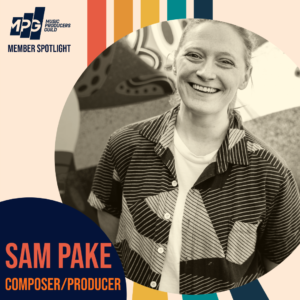Sam Pake – Full Member
 How would you define your main role on most of the projects you work on at the moment?
How would you define your main role on most of the projects you work on at the moment?
Executive sync producer by day, writer/producer by night. My career has grown around working with artists and producers, helping shape their tracks into being as sync-friendly as possible. In my own time, I write and produce my own music and collaborate with other artists. Always at the desk, never behind the mic (which is a blessing, trust me!).
Please tell us a bit about your musical background. How did you get started in the music industry? What was your pathway to your current role?
When I was eight years old, I had music lessons on the electric organ. Foot-pedals and all. I have no idea what sparked this interest, but blasting Kylie’s ‘The Loco-Motion’ on a 1980’s Yamaha electric organ just felt…right. From there, I picked up guitar, drums, saxophone and whatever else I could make a noise with.
I studied music at university, where I was first shown Logic Pro a whole new world opened before me. Being a nervous performer with zero self-confidence and red-light-syndrome, I became fascinated with recording and manipulating sound at my own leisure without the pressure of being in a studio (and usually being the only woman present). I’d always loved writing music more than performing it, and now I had unlimited amount of sounds, effects and instruments at my disposal. Turns out that’s called producing, and I loved it.
At that point, I thought I wanted to be a film composer; but I don’t have the attention span to sit and watch a film, never mind score one. So I moved more broadly into sync music: first a music supervision internship in LA; then running and transfer engineering at an audio post-production house in Soho; then joining an independent production music label as an assistant and working my way up; to head of production at BMG; then to senior producer at Universal; and now currently senior sync creative at both Power-Haus Creative and A&G Sync. What a ride.
What or who inspired you to follow this path?
Unironically, Avril Lavigne. Seeing her write songs AND sing AND play guitar AND drums AND piano at my first ever gig blew my mind and formed 90% of my personality. There weren’t many visible female, non-binary or trans role models in the early days of my career, so it’s been a great encouragement seeing the industry recognition of incredible talent like Catherine Marks and Alex Hope. Day-to-day, I’m inspired by the people I’m lucky enough to have the opportunity to work with (which is a very long list), but special mentions to the powerhouses that are Katie Tavini, Charlie Deakin-Davies and Ruby Duff. They pushed me forward in ways they probably aren’t even aware of.
Are there any highlights from your work that you are particularly proud of?
I was extremely passionate about spearheading the 100% HER initiative at Universal, championing women in the music industry. I was lucky enough to run mentorship schemes, songwriting camps and a host of educational panels that started in the UK and has now spread globally (Singapore, South Africa, Germany, France, USA). I’m continuing my DE&I outreach with two incredible collectives, 2% Rising and Hen Hoose.
This year I was nominated for Music Creative – Spirit of the Studio at the Women in Music Awards, which was an incredible moment for me and I still can’t quite believe it!
What’s one tip you can share with other MPG members that could help their workflow?
Collaboration is key. I really suffered from imposter syndrome and it prevented me from reaching out to other people at the start of my career; I would go back and change that if I could. Always offer someone something before asking for something; collaboration needs to come from both sides. You will always learn something new from working with others.
What’s one tip you would like an MPG member to share with you? (learning/growth from others)
Advice on how to put yourself out there/sell yourself effectively. I struggle with self-marketing.
Do you have any words of wisdom for people wanting to get into a similar music production role to yours?
Honestly, I think your work ethic and likeability are more valuable than your music. You can always learn and improve your music skills, constantly hone your craft, and be top of your game – but if you’re not nice to be around, then people won’t want to work with you. Always bring others up alongside you, and stay humble.
space
 How would you define your main role on most of the projects you work on at the moment?
How would you define your main role on most of the projects you work on at the moment?